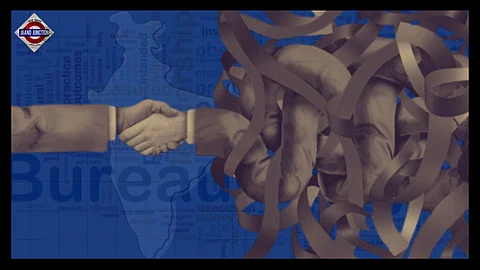

Every government scheme, every public service, and indeed, much of our nation's progress hinges on a largely unseen force: its contractors. We are the backbone, tasked with delivering essential supplies and services, from catering to critical procurement. With a significant portion of government work now privatized or contractual, our role in nation-building, in making government benefits accessible, has become immense. Yet, there’s a persistent, often invisible, "handbrake" on this machinery, a flaw that explains why, despite our potential, we often lag behind nations that began their reforms alongside us in 1947.
This handbrake, in my experience, is the unyielding, traditional pace of our bureaucratic system.
As a government contractor primarily dealing with catering and procurement, I’ve witnessed this inefficiency firsthand. Back in 2020, full of hope, I dove into this world. Little did I know, I was about to fall into a deep trap. My last year alone saw me spending over 2000 hours – that's effectively half a working year – just to clear my dues and complete closure formalities in various government offices. This isn't productive work; it's an agonizing battle with systemic inertia.
My plight, I've come to realize, is not unique to contractors. It's a pervasive symptom of a system that impacts millions of ordinary citizens daily. The same bureaucratic hurdles that strangle businesses also suffocate public services:
This ground-level inefficiency stems from a fundamental issue: the working style in many government offices is still stuck in a traditional, often archaic, pace. Seniors, while experienced, sometimes perpetuate outdated methods. More alarmingly, young minds entering these departments frequently adopt the same "lazy mindset" rather than injecting fresh energy, innovation, and accountability. With fewer new recruitments and new appointments for fresh talent, the system struggles to evolve, creating a cycle of inertia. The lack of robust accountability mechanisms further exacerbates this problem.
This bureaucratic drag is a direct contradiction to our national aspiration of Aatma Nirbhar Bharat – a Self-Reliant India. True self-reliance isn't just about manufacturing goods domestically or crafting impressive policies from the top. It's fundamentally about fostering an environment where citizens and businesses can thrive, where ideas can flourish, and where progress is enabled, not hindered, by governance.
When contractors face 2000 hours of administrative purgatory, when youth lose years waiting for exam results, or when citizens are bogged down by simple paperwork, the cumulative effect is immense. It erodes trust, stifles entrepreneurship, discourages investment, and directly slows down economic momentum. A nation cannot be truly self-reliant if its fundamental administrative machinery is a barrier to its own people and businesses.
My 2000-hour ordeal, and the shared experiences of millions, serve as a stark warning. The slow growth rate on the ground level is alarming and a significant barrier to our country's progress. For India to truly rise as a global power and achieve the vision of Aatma Nirbhar Bharat, we need a fundamental shift in mindset and operational efficiency within our government departments. It's time to dismantle the 2000-hour trap and pave the way for faster, more accountable, and truly citizen-centric governance.
Views expressed in Citizen Junction stories are that of the author and solely of the author, submitted to Jaano Junction through WRITE. Start writing on Jaano Junction to get your opinion published. Click Here to start your citizen journalism journey.
